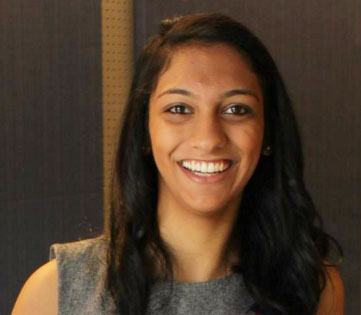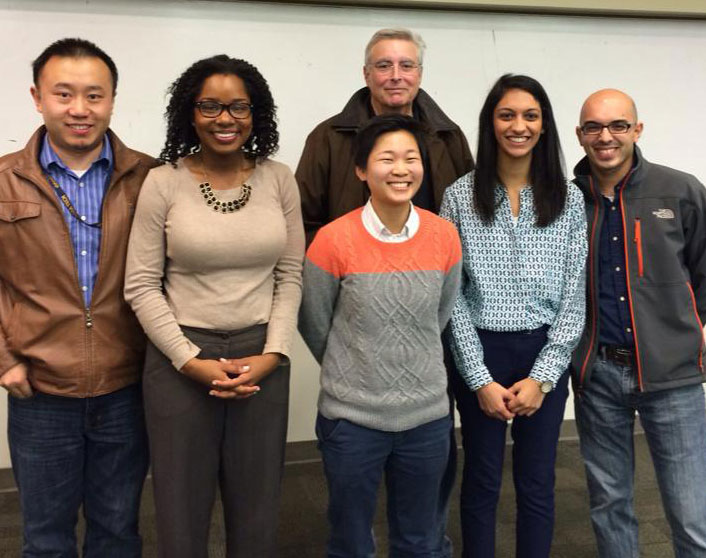Misha Desai (BSIE 2016) has explored the team aspect of entrepreneurship from the perspective of several different projects, including the Grand Challenges Living Learning Community (GC) and the Vertically Integrated Projects (VIP) program.
She came to Georgia Tech knowing that she wanted to be an engineer, having been on a FIRST Robotics team in high school. After looking into the Stewart School of Industrial & Systems Engineering (ISyE) and the curriculum it offered, she found that it provided the mix of business and engineering that interested her -- "even going beyond," she says, her expectations of what she would learn at ISyE.
She was able to put her IE skills into play as part of the GC, which promotes student-driven cross-disciplinary teams that investigate societally relevant technological and sociological problems. Together, students in teams attempt to solve the world's most "wicked challenges," as Desai puts it.
Desai's particular team developed HIVE (Health Integration Via Education), a program targeted toward fourth graders in Chattahoochee Elementary School in Duluth, Ga. “We looked at how technology and interactive lesson plans impacted how students responded and retained health information.” The students wore a clip-on pedometer that plugged into a computer and connected to a website called Zamzee. The students were awarded points for the steps they took.
“We linked that back to a curriculum, so we would go in every week and teach the students about health,” explains Desai. “What we saw was that the kids were really receptive to the program we were creating, so the fact that they could wear these pedometers and take them home – we saw their fitness levels exceed our control group’s by almost 60 percent. So it was a huge difference.”
As the program developed, Desai and her team discovered the possibility of turning the project into an entrepreneurial venture by creating their own startup company. She says, "We began connecting with the start-up community in Atlanta and resources around campus to understand what building our own company would require and to also build our own wearable prototypes."
Desai’s specific role in the potential business was team CEO. As an IE, “we’re really good at strategy, critical thinking, and problem solving.” She was responsible for making sure each team in the business was on task and meeting the project deliverables.
Ultimately, due to technical challenges – as well as the fact that not everyone on the team was willing to drop out of school and work on the startup full-time – the GC team decided to put the project on hold. “We were really close,” Desai adds. “We were about to launch the business – we were looking through the paperwork and everything. [But] having the dedication to doing one thing is an important part of the process.”
In addition to the GC, Desai also participated in the VIP program, which offers credit to students for participating on research teams consisting of undergrads, graduate students, and professors. “Many of the teams also focus on building projects from an entrepreneurial perspective,” she says.
For three semesters, she was part of the patient similarity team. As Desai explains it, “This project focused on clustering patients into meaningful groups to provide targeted provider care and better use of hospital resources. As part of the program, we not only built our minimum viable product but also worked with external groups to gain feedback, write business cases, and present to industry experts on our project. Our faculty lead really pushed us to look at our projects from a business perspective and taught us the keys to really making the right pitch.”
As part of a VIP team, Desai was once again using her IE-driven business and engineering skills. When asked how her IE skills complement her entrepreneurial work, Desai reflects for a moment and then says, “Our curriculum encompasses a lot of different skills: business, engineering, and computer science. Thus, as an IE, I find myself at the intersection of all these groups, and it’s a really interesting spot to be in. We’re really the jack-of-all-trades. We have the breadth to manage teams effectively and understand processes from a holistic perspective. However, we also have the skills to dive further in and concentrate in a particular area to enable us to step into entirely different roles.”
As for her future work, Desai feels prepared with her IE skills “to look at problems and understand them analytically and from a holistic perspective. I would love to pursue entrepreneurial work after I graduate and to be a part of something that disturbs traditional ways of how things operate. I find innovation and challenges and possibilities of entrepreneurship to be really exciting. I am also really interested in analytics and how we can use data to drive new insights about people, businesses, and how processes work.”
She's going to use those analytical IE skills as an operations leadership intern for Amazon this coming summer: “I think this will be a really cool opportunity to see such a large supply chain network that’s really been innovating processes and disturbing traditional supply chains. I’ll basically act as manager of the operations facility – which is where Amazon gets your order, puts it in a box and ships it to the customer – a warehouse, essentially – and shadow the actual operations leader. So I’ll be managing a team of 100 associates on the floor the entire time.
“This will be focused more on the supply chain on the operations side of things, so I’ll manage the supply chain at this warehouse and make sure everything is flowing through it, monitoring and reducing bottlenecks. It’s a collaboration of the supply chain classes I’ve taken at Tech and then a lot of the optimization tools that come into play when I start looking at how I’ll change my facility or how another change might affect the system. The idea of doing two-day delivery, same-day delivery, delivering your groceries – those are all really cool things. It’s not how people imagined traditional supply chains, and the fact that Amazon can do it and do it so effectively – there’s a lot of opportunity to learn from that.”
While not sure what she'll be doing after graduation – perhaps eventually going on to get her master's degree in statistics or analytics – Desai did say that she is “looking for an environment where I can continue learning, innovating, and working with really talented people. And when you’re in an atmosphere where you’re ‘disturbing’ or causing some type of change, it’s cool in that you don’t know what to expect; you can only anticipate and think of every possible thing that could go wrong. So there’s a lot to think about, but it’s never been done before, so you’re on your own. You get to decide what you want to do, which is a cool place to be in.”

